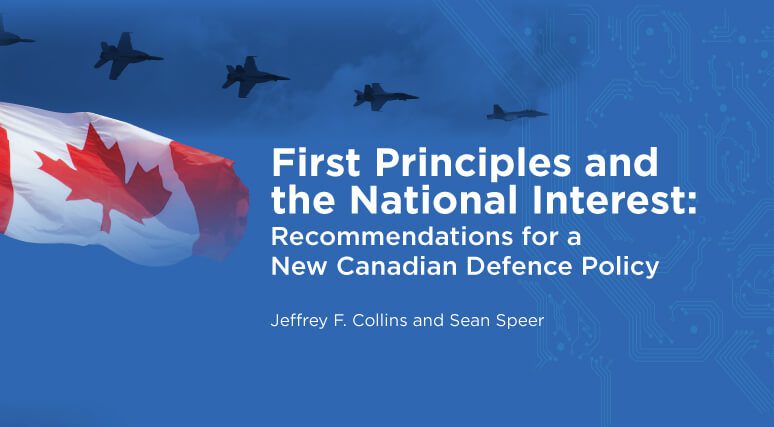Nineteen defence policy thinkers and practitioners provided detailed comments to inform MLI’s analysis of Canada’s defence priorities and principles, security environment, alliances, UN involvement, and future capabilities
OTTAWA, March 9, 2017 – The Macdonald-Laurier Institute has teamed up with 19 leading defence policy thinkers and practitioners from across Canada to help shape the future of the country’s defence policy.
The paper, titled First Principles and the National Interest, steps back to explore the first principles of Canadian defence policy – by answering the “what” and “why” of defence rather than simply “how.”
It goes beyond a relatively narrow discussion of the Canadian procurement system, recapitalization, and other “how” matters. The answers to these questions flow from a greater understanding of what the Canadian military is and what we as Canadians want it to do.
The authors – Sean Speer and Jeffrey Collins – hope the paper will contribute to Ottawa’s plan for a new defence policy. The government’s Defence Policy Review is supposed to be released in 2017.
To read the full paper, titled “First Principles and the National Interest: Recommendations for a New Canadian Defence Policy”, click here.
It is difficult to deny the need for revisiting Canadian defence policy. Nearly a decade has passed since the Government of Canada last released a statement on defence policy, this being the Conservative’s 2008 Canada First Defence Strategy (CFDS).
Circumstances have greatly changed. Successive governments reduced and reallocated promised defence funding to later years, raising questions on the CFDS’s fiscal foundations.
One can also add the changed global security environment, in which Canada must contend with a resurgent Russia, an aggressive China, and a renewed terrorist threat – not to mention a new US administration under President Donald Trump that has raised serious concerns in capitals around the world, including Ottawa.
The 19 experts who responded provided detailed comments based on a 12-question survey sent out in mid-2016. Their comments, in turn, are used to inform the paper’s analysis of Canada’s defence priorities and principles, security environment, alliances, UN involvement, and future capabilities. The paper does not identify respondents by their specific comments and respondents do not necessarily endorse the paper’s findings.
The paper sets out a number of recommendations on Canadian defence policy that the Trudeau government – still in the process of completing its DPR – would do well to heed:
- Canada’s defence priorities & principles: The CAF needs to be funded and properly equipped, and should focus on responding to immediate defence concerns on global terrorism and supporting NATO in Eastern Europe. Global deployments need to be guided by clear rationales and exit strategies, and should occur alongside like-minded allies. “Winnability” should be emphasized. In this context the “Responsibility to protect” (R2P) should not be used as a principle for defence. In the words of one expert, defence policy should not be about making “political elites feel good about themselves.” (Other respondents were more supportive of Canada acting to protect freedoms abroad.)
- Canada’s security environment: Canada needs to ensure its relationship with the US does not deteriorate over isolationist or security concerns, even as it reassures allies in Eastern Europe and the Asia-Pacific on the great power challenge posed by Russia and China. Weak governance and failed states in other regions will remain an ongoing concern. (One respondent referred to an “arc of instability” in the Middle East, Africa and Southern Europe.) So too will issues of domestic terrorism and hate groups, cyber threats, WMD proliferation, and climate change and environmental disaster.
- Canada’s alliances: Canada needs to examine whether it should increase defence spending to 2 percent of GDP a per agreement with NATO allies, and most respondents emphasized an important role for NATO. Canada should also pursue information-sharing arrangements with the US (maritime intelligence, cyber-security), replace its aging CF-18 fighters, upgrade the North Warning System in the Arctic, and notify the United States of its interest in participating in ballistic missile defence (BMD received substantial support from the experts surveyed, with one saying Canada’s policy is “looney tunes and needs to be abandoned”). US participation in NATO also needs to be encouraged. It is considered of great importance that the Canada-US relationship not “be allowed to atrophy”.
- Canada’s role in the United Nations: In the words of one respondent, the UN’s effectiveness in “international military undertakings must be viewed with a very jaundiced eye.” Canadian military contributions to UN missions should be in areas in which the organization needs improvement. Training and technical support should be prioritized over deploying frontline ground forces. Canada also needs to work with like-minded countries in reforming the UN security and governance structure. But this should not prevent Canada from advancing its defence interests in regional, multilateral organizations in the Arctic and Asia-Pacific (e.g., Arctic Council, ASEAN, ADMM-Plus).
- Canada’s future capabilities: Canada needs a multi-purpose, combat-capable force, but certain niche capabilities can be enhanced (e.g., special forces, military training, and disaster assistance). In terms of procurement, opportunities for joint purchasing of military equipment with allies should be explored and off-the-shelf purchasing should be considered when possible. A “whole-of-government” approach is also essential if Canada is to leverage all its resources (including defence) in international affairs.
***
Jeffrey F. Collins is a research fellow with the Centre for the Study of Security and Development at Dalhousie University and a research associate with the Atlantic Institute for Market Studies.
Sean Speer is a Munk Senior Fellow at the Macdonald-Laurier Institute.
The Macdonald-Laurier Institute is the only non-partisan, independent national public policy think tank in Ottawa focusing on the full range of issues that fall under the jurisdiction of the federal government.
For more information, please contact Mark Brownlee, communications manager, at 613-482-8327 x105 or email at mark.brownlee@macdonaldlaurier.ca.





